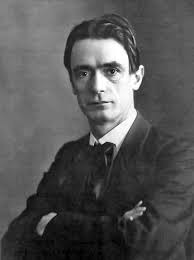

Many of our customers are familiar with Waldorf Education, whether they are Waldorf school teachers, parents with children in a Waldorf school, or have otherwise heard of it. However, not everyone knows about the man behind the movement and philosophy. We want to take a few moments today to introduce you to the founder of Waldorf schools, Rudolf Steiner.
Rudolf Steiner (1861-1925) was a philosopher, social reformer, and founder of Anthroposophy, a spiritual movement based on the idea of the evolution of human consciousness. Steiner's contributions to education and child development have had a profound impact on the world, influencing many educators and parents to rethink traditional educational models and embrace a more holistic approach.
Childhood and Education
Steiner was born in Kraljevec, Austria-Hungary (now in Croatia) to a railway station master and a homemaker. As a child, he displayed an early interest in philosophy and spirituality, reading works by philosophers such as Kant and Fichte. Steiner's early education was typical of his time, focusing on rote learning and memorization. However, his thirst for knowledge led him to explore a wide range of subjects, including science, literature, and history.
Steiner attended the Vienna Institute of Technology, where he studied mathematics, physics, and chemistry. After graduating, he worked as a teacher and private tutor, which sparked his interest in education and child development. In 1894, Steiner was invited to become the editor of the Goethe archives in Weimar, Germany, where he began to develop his ideas on spiritual science and the evolution of human consciousness.
Approach to Education and Child Development
Steiner believed that education should not only focus on intellectual development but also on the development of the whole person – body, soul, and spirit. He advocated for a holistic approach to education that would take into account the individual needs and capacities of each child. Steiner believed that children have unique abilities and talents that should be nurtured and developed in a supportive and stimulating environment.
One of Steiner's most significant contributions to education was the development of the Waldorf method, a form of education based on his philosophy of anthroposophy. The Waldorf method emphasizes creativity, imagination, and practical skills and is designed to meet the needs of the whole child. Waldorf schools emphasize experiential learning, with students engaging in hands-on projects and artistic activities that help develop their cognitive, social, and emotional skills.
Steiner also believed that child development should be viewed from a spiritual perspective. He believed that children go through different stages of spiritual development, each with its own unique characteristics and challenges. Steiner's concept of "soul development" emphasized the importance of nurturing the spiritual and emotional well-being of children, helping them to develop a sense of purpose and meaning in their lives.
Legacy
Steiner's contributions to education and child development have had a significant impact on the world, with Waldorf schools and other educational institutions based on his principles operating in many countries. Steiner's holistic approach to education has been embraced by many educators and parents, who have recognized the importance of nurturing the whole child and providing a supportive and stimulating environment for learning.
In addition to his contributions to education, Steiner also made significant contributions to philosophy, spirituality, and social reform. He believed that the evolution of human consciousness was the key to achieving a more just and equitable society. Steiner's ideas on social reform emphasized the importance of community building and the creation of self-sustaining, cooperative societies that could meet the needs of all members.
Steiner's philosophy of anthroposophy has also had a significant impact on spirituality, with many individuals and organizations adopting his ideas on spiritual science and the evolution of consciousness. Steiner believed that spiritual development was an essential part of human life, and his ideas on spirituality have influenced many people's views on the nature of reality and the purpose of human existence.
"Receive the children in reverence; educate them in love; let them go forth in freedom." - Rudolf Steiner


